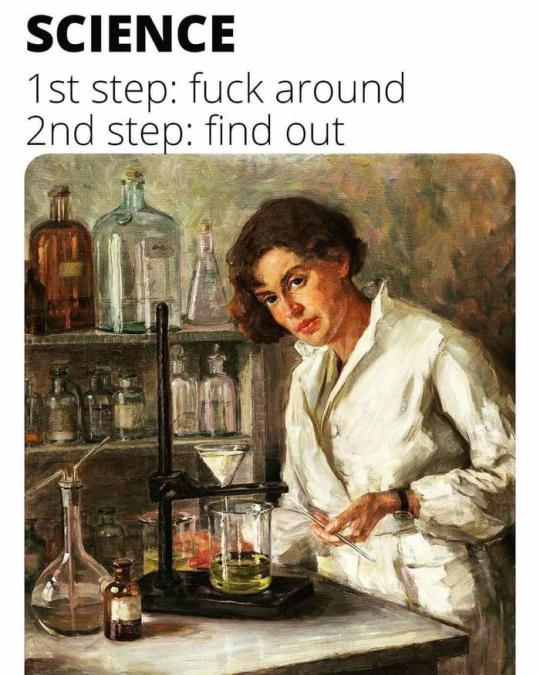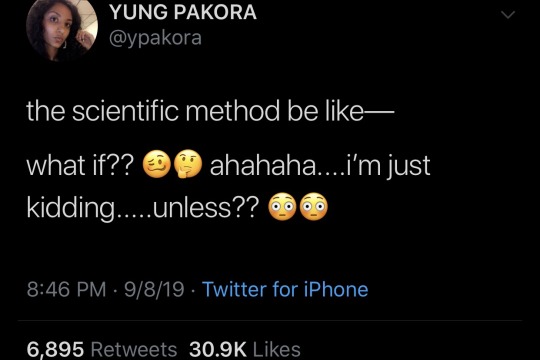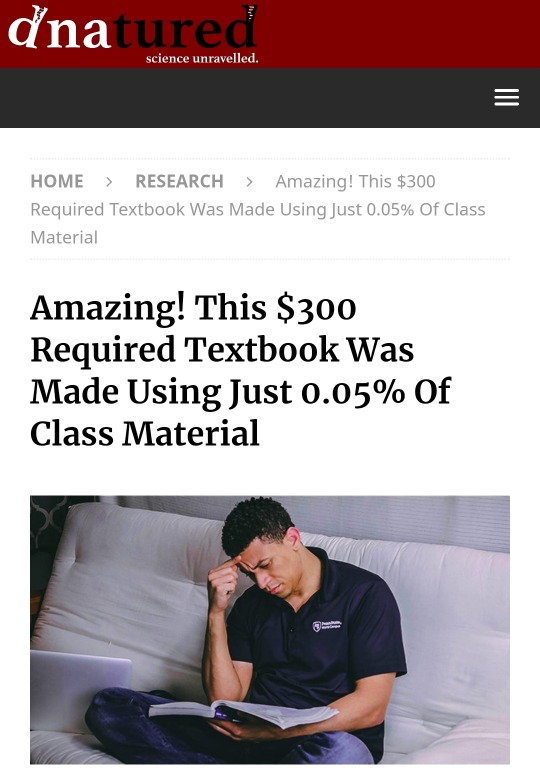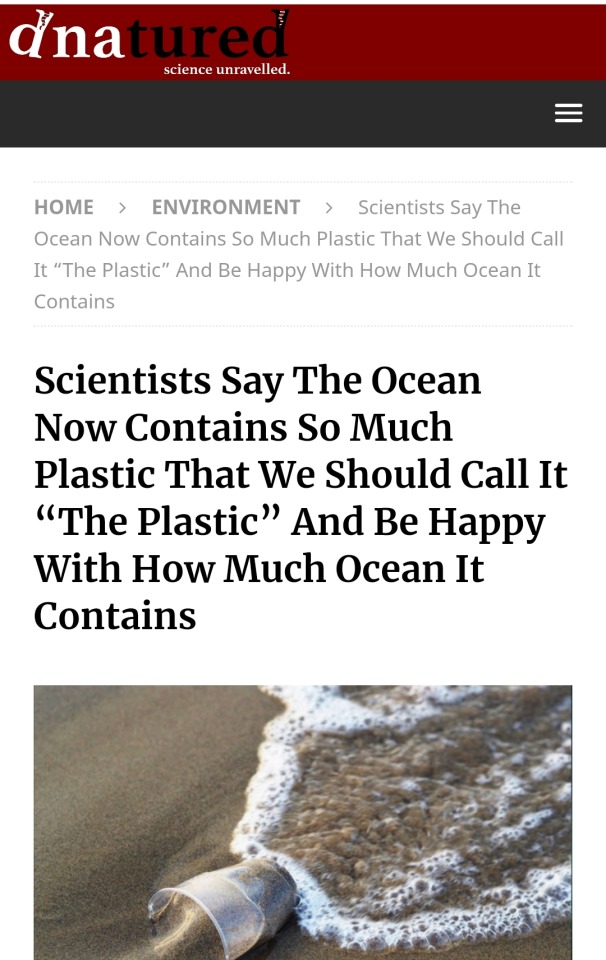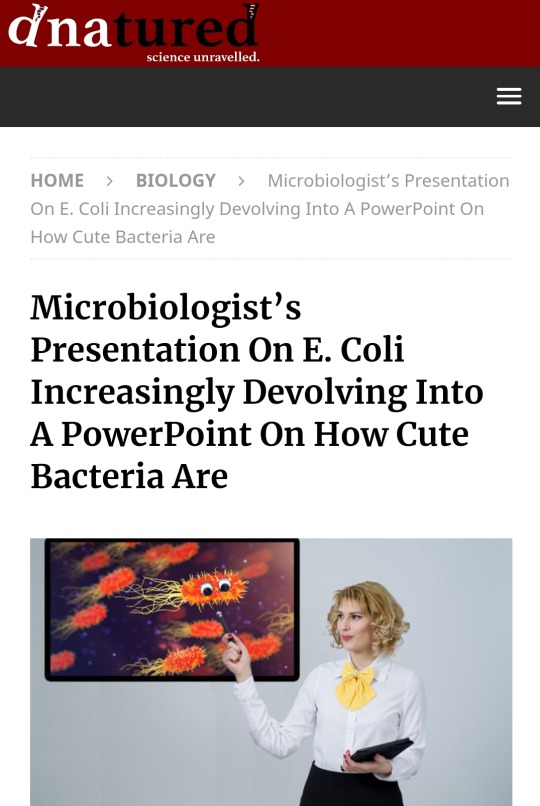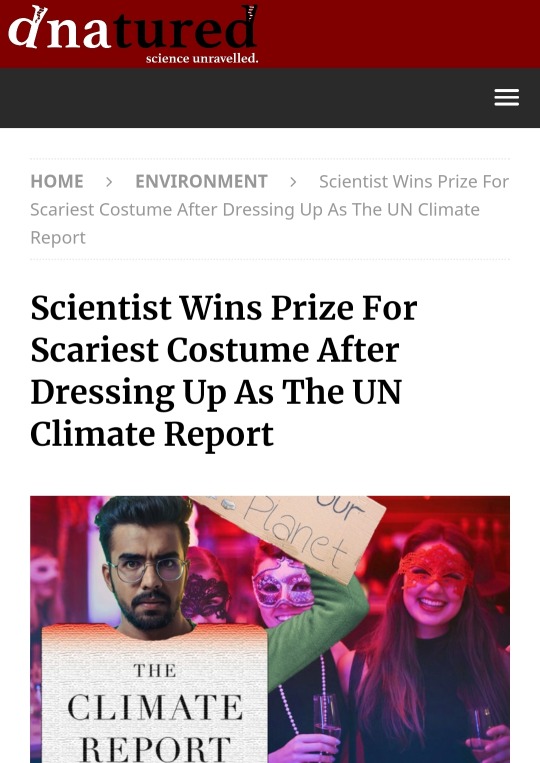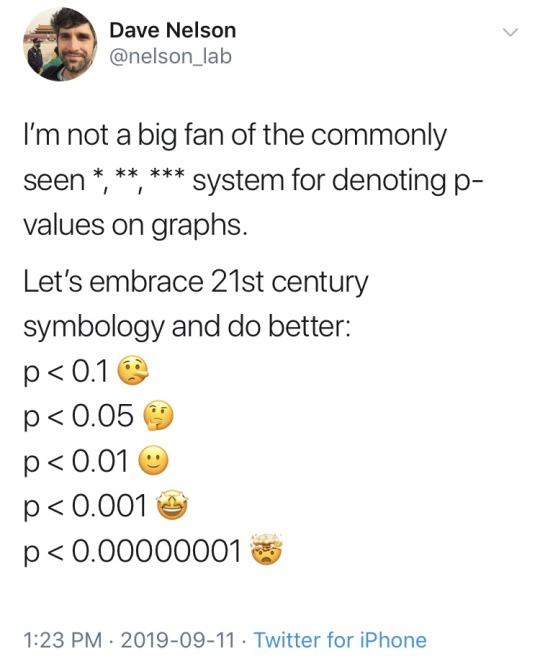Text
The holy grail of searching through academic literature is coming across a string of publications that are like:
Here’s An Idea. Smith et al. 2016
Terrible Idea; a comment on Smith et al. 2016. Johnson 2016.
You’re Wrong Too; a response to Johnson 2016. Nelson 2016.
Guys Just Stop Fighting, None Of Us Know What’s Going On; a Review of the Current Literature. McBrien 2017.
174K notes
·
View notes
Text

[The name [Tobleronius] refers to the chocolate brand “Toblerone”, one of the favourites of the first author. The shape of T2 looks like one of the triangles that compose Toblerone bars (if one has enough imagination and love for chocolate!). Here is hoping that someday a wasp-shaped chocolate bar is produced.]
(the paper also include a genus Ohenri that is a reference to a different candy bar)
Fernandez-Triana J, Boudreault C (2018) Seventeen new genera of microgastrine parasitoid wasps (Hymenoptera: Braconidae) from tropical areas of the world. Journal of Hymenoptera Research 64: 25-140.
https://doi.org/10.3897/jhr.64.25453
258 notes
·
View notes
Link
“We’ve built and maintained an ableist system that favors certain physical or mental attributes over others, and makes it so that these characteristics become a prerequisite for working in science.”
2K notes
·
View notes
Note
Do you have any Tips for Academic Success?
Have You Considered A Deal With The Devil

30K notes
·
View notes
Text
Okay so does anyone have any advice for responding to emails i have neglected for 1+ months from my supervisor? I know I mostly joke on here but I’m dead serious right now unfortunately. I made the decision that I want to try to keep doing my PhD despite it all but I have straight up been a horrible student, employee, and person... and I don’t know how to address that honestly. Especially since just citing my depression and adhd and the pandemic and having to move back in with my emotionally abusive parents doesn’t seem valid or enough somehow?? Help :(
61 notes
·
View notes
Text
*sips green chemicals out of my Erlenmeyer flask using a silly straw*
20K notes
·
View notes
Text
looking at the list of application documents and statements and plans i need to apply for this phd, and honestly it’s so long i’m surprised they don’t require a finished phd thesis for this, jesus effing christ.
#applications are awful!!!!!!!!!#guess that's one way of screening applicants lol making the application so long no one actually manages to complete it
0 notes
Text
Advice for grad school
Okay, I know that my blog is like 98% dragon age stuff and the other 2% comes from other video game posts, but I’ll just put this up here anyway.
I recently finished my PhD, and it was a difficult, grinding process. So, for anyone who is a little terrified of grad school or how to get a job/etc. afterwards, this post is for you.
Here are some of the most important lessons I learned from grad school.
- Make friends with your program’s admin (if you can and if they are nice, decent people). These people know what funding opportunities are coming up for students and they can nominate you for special awards from the University that you didn’t even know existed. They can help you through the tangles of paperwork for both the school and outside grants and funding. They are usually a treasure trove of information and can be a really useful addition to your professional network as well.
- CHOOSE YOUR COMMITTEE WISELY. If you’re in the US, most PhD programs will have you select a committee of professors to review your grad school progress, and, ultimately, your committee will decide when your work merits your defense and graduation. And you, as the student, gets to choose your committee. Make no mistake, this will be the MOST important decision you’ll make in grad school. Your committee can make or break your experience. Don’t choose people for the name or prestige. Choose a committee that will support you and your career decisions. I know that nobody wants to believe that they will have issues with their mentor, but trust me, even the best mentoring relationships can hit a rough patch. And when your mentor can single-handedly decide your future (the power dynamics in academia are disgusting and ridiculous), you’re going to want a support system. Now, many people never need to use their committee for this purpose, but trust me on this. For this, it is better to be safe than sorry. It’s better to have a supportive committee just in case. And, if you are having issues, whether its a difference in opinion over the future of the project, or when you should graduate, go to your committee. They are there to advocate and mediate for you.
- Choose a mentor, not a project. Do NOT choose your advisor based solely on the research/project subject area. Do NOT choose an advisor based solely on that advisor’s prestige and reputation. You’re locked into grad school for 5+ years (and if you are in a STEM program, sometimes your PhD can last 8-10 years which is longer than the average marriage in the US!). Your mentor can make or break your grad school experience, so choose carefully. Make certain that your advisor fits your style. If you are hands-off you are not going to want a micro-manager. If you like weekly check-ins, you are not going to want to be in a huge group with a famous mentor who spends 75% of the year traveling and giving talks. So, sit down with yourself and think about what things are important to you. What is an absolute deal-breaker? What are the things you can compromise on. Have a clear idea of your boundaries then choose a mentor who falls within those boundaries.
- Define your goals with your advisor. Where most PhD students get de-railed is having different expectations for success than their advisors. And, trust me, this can truly de-rail you. One of the first things you should do once you choose an advisor is to sit down and create an outline with them defining set-points. What constitutes success for defense? What do you need to submit a manuscript? Have a rough outline of what your next 5 years will look like. Know that you will need to be a little flexible because life is unpredictable and, if you’re a scientist, your results can also be unpredictable, too. But you need to have a clear roadmap with goals and markers for success. If you don’t, you’ll end up meandering and adding an extra, unnecessary 2-3 years to your grad school experience.
- Have a support system. Grad school is grueling, I won’t lie. Also the power dynamics are a thing. Some advisors expect their students to dedicate every minute of their lives to their project. You deserve balance. You deserve a life beyond grad school. Don’t ever let ANYONE devalue you.
- If a situation feels icky or uncomfortable, more than likely it IS icky and wrong. The MOMENT you feel uncomfortable, talk to your support system and talk to the appropriate resources at your University. Many universities are instating a program called Ombuds. This office is a designated neutral or impartial conflict resolution practitioner who provides confidential and informal assistance. They can tell you if what you’re experiencing is harassment, bullying, etc. and can help you decide your next move. Familiarize yourself with the resources your university has and whether or not they have an ombud office.
- Start networking on day 1. Many people will disagree with me and say that you don’t need to network until the end. This just isn’t true. Especially if you’re first gen or don’t have wildly successful and prestigious family members, start making contacts ASAP. Even though you’re locked in for 5+ years, you’ll be amazed at the other opportunities you’ll have. You want to become an adjunct instructor while still doing your PhD? You want to found a non-profit? You want to make a short film about your work? Guess what, NETWORKING! I got SO MANY unique opportunities during grad school through networking contacts and those experiences really helped when it was time to go to the job market. Not to mention networking also offers you exposure. I got to see a wide range of job titles and functions and could watch how my first-networking-contacts-now-close-friends progressed in their career. This is especially great if you want to leave academia because most universities don’t have programs or resources for careers outside of academia.
- Networking gets you a job. I guarantee you if you apply online to jobs, you will likely submit 400+ applications and hear back from maybe one of them. If you want a job, you are going to have to get it through your professional network. This is wildly unfair and creates yet another hurdle for underprivileged/disadvantaged and shy students (among many other factors). What I can tell you is that it is going to feel weird, but send a message through LinkedIn to make networking contacts. I know, this is weird and uncomfortable, sending a message to a stranger, but it works. Most people will respond to you and if they don’t, it is not personal. A lot of people stop checking their LinkedIn if they are settled in a job that they are happy with. So don’t worry if the person doesn’t message you back. And when you message a person, ask them questions. Tell them that you are interested in the company and would like to ask them questions about their job and their experience. NEVER go straight for the “I’m interested in X job, here’s my resume.”
228 notes
·
View notes
Text
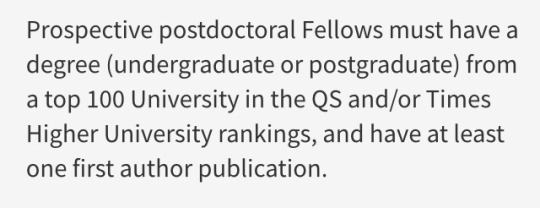
A new level and era(!) for pedigree requirement and discrimination in postdoc positions.
65 notes
·
View notes

